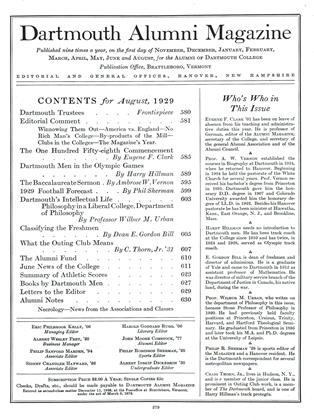There are two courses open to honest men—the same courses that Jesus pointed out in this parable to those who came to hear him in the unsettled time in which he lived. You can look on your powers and ideals as precious jewels that must be guarded anxiously against the unprincipled forces of the new age or as tools to engage in the building of it. If they seem to you primarily jewels to be kept untarnished, you will bury them out of harm's way, as did the timid man of the parable; if you regard them as tools, you will, like the wiser servants, invest them in a large enterprise. The counsel of Jesus, the supreme adventurer of history and therefore its supreme figure, is all in favor of this latter course. He declares in so many words that no one really possesses what he fears to lose; that from him that hath not shall be taken away even that which he hath. This parable has made the philosophy of safety-first contemptible in the eyes of men. In its stead it has erected the most fitting philosophy of life for those who live in an obviously unsettled time like ours. It may be condensed into four words: Take thenobler risk. It is a slogan which Christ confirmed by his life and by his death. He affirms that if a talented man adopts it he will understand the joy of the Lord. By following it, we attain to spiritual certainty in a time of spiritual uncertainty. Decisions are demanded from us all the time on inadequate knowledge. There is always risk; we are to take the nobler one.
 View Full Issue
View Full Issue
More From This Issue
-
 Class Notes
Class NotesCLASS OF 1879
August 1929 By Henry Melville -
 Article
ArticleAlumni Council Meetings
August 1929 -
 Article
ArticleThe One Hundred Fifty-Eighth Commencement
August 1929 By Eugene F. Clark -
 Class Notes
Class NotesCLASS OF 1899
August 1929 By Warren C. Kendall -
 Class Notes
Class NotesCLASS OF 1903
August 1929 By John Crowell -
 Class Notes
Class NotesCLASS OF 1918
August 1929 By Frederick W. Cassebeer
Ambrose W. Vernon
-
 Article
ArticleThe Baccalaureate Sermon
AUGUST 1929 By Ambrose W. Vernon -
 Article
ArticleHeritage of the Past
AUGUST 1929 By Ambrose W. Vernon -
 Article
ArticleResults of Risks
AUGUST 1929 By Ambrose W. Vernon -
 Article
ArticleDiscrimination in Risks
AUGUST 1929 By Ambrose W. Vernon -
 Article
ArticleTake the Nobler Risk
AUGUST 1929 By Ambrose W. Vernon -
 Article
ArticleThe Supreme Risk
AUGUST 1929 By Ambrose W. Vernon







